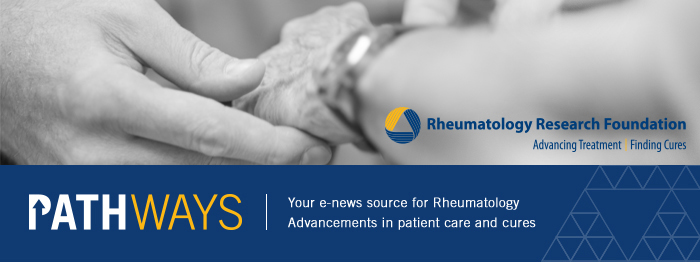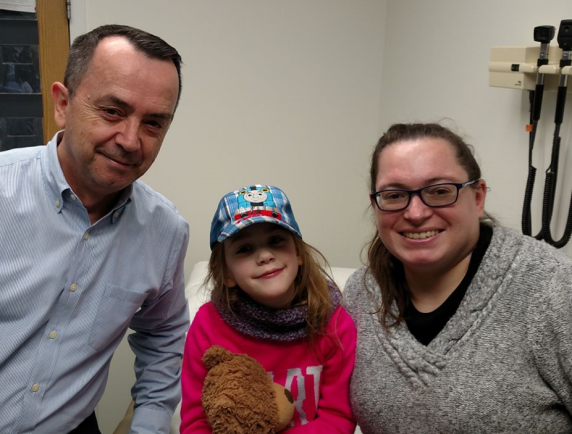Pathways

Volume 7 • Issue 2 • February 2018 • Rheumatology Research Foundation
Foundation Collaboration with NIH Provides Important New Clues about Potential Therapies for Arthritis and Lupus
The National Institutes of Health (NIH) has released new datasets that will help clinical investigators accelerate therapies for rheumatoid arthritis (RA) and lupus. The datasets were developed through the Accelerating Medicines Partnership for Rheumatoid Arthritis and Systemic Lupus Erythematosus (AMP RA/SLE) program, which was launched in 2014 as a public-private partnership to spur development of new therapeutic options for RA and lupus.
The Rheumatology Research Foundation is proud to be a partner of the AMP program. The newly released information holds clues for potential research targets that may lead to future treatment options for millions of patients.
The new datasets provide valuable information about the structure and properties of individual cells in RA and lupus disease tissue. Researchers will use this insight to gain a clear picture of the biological pathways and other factors that cause people to develop these diseases. The data also enables investigators to identify specific treatment targets that can halt or impede the progression of RA and lupus, an important step toward developing new effective therapies for these conditions.
“This pioneering program seeks to speed the development of new ways to combat a range of devastating diseases that affect millions of people,” said NIH Director Francis Collins, MD, PhD “AMP RA/SLE is entering an exciting phase as experts around the world will begin to mine this invaluable biomedical resource in search of tomorrow’s cures.”
The AMP RA/SLE program is an unprecedented public-private partnership that aims to identify promising biological targets for potential therapeutics and reduce the time and cost of developing them. Collaborative efforts like AMP RA/SLE exemplify the Foundation’s commitment to pursuing dramatic advances in the diagnosis and treatment of rheumatic diseases and supporting high-quality, innovative research conducted by the best and brightest investigators.
The Foundation has committed millions of dollars directly to rheumatology research and training programs. Watch our new video to learn more about our impact on the rheumatology community.
#RheumLife: Early intervention
Accurate diagnoses are a struggle for many patients, a number of whom spend years seeking an explanation for their symptoms. Misdiagnoses are not only frustrating but can have long-term effects when diseases go untreated. Rheumatologists have a deep understanding of the physical, mental, economic, and societal impacts of rheumatic diseases and are skilled at recognizing and treating the wide array of rheumatic disease symptoms that can affect almost any organ in the body. Studies show a timely diagnosis and appropriate treatment can prevent damage to joints and other organs, improve long-term function, and increase the likelihood of achieving disease remission. Foundation efforts in recruitment and education work to ensure every patient has the access to a rheumatologist.
Stephanie DeNicola-Turner
September 1999, I was 22 and in college when I “got sick,” which is how I refer to my RA onset. I was the healthiest I had ever been, eagerly anticipating student teaching and graduation. I began to develop joint pain, which the campus clinic attributed to my senior thesis and too many hours at a computer. Four weeks later I fell while walking on campus and was rushed to the local ER.
Thirteen doctors saw me over the next three weeks – it felt like forever – before I was diagnosed with seronegative RA. I was immediately put on methotrexate about a week after I was diagnosed. Due to the risks, I was told to give up on my dream of teaching.
Six weeks later, I was prescribed a TNF inhibitor. After five weeks, I switched to another TNF inhibitor and immediately noticed a difference. Six months later, I was pronounced as medically induced clinical remission, a status I have enjoyed for 18 years.
I’ve done so much in these 18 years. I finished the 2001 Honolulu Marathon and the 2002 Bermuda Half Marathon while raising money for the Arthritis awareness. The extraordinary part of my life is the ordinary. The right treatment enabled me to live my life. That career I gave up – well I just took the scenic route here. And the view is glorious!”
The Efforts to Help
 Arundathi Jayatilleke, MD is developing an online game to teach medical students how to conduct exams for patients with rheumatoid arthritis. The platform will teach elements of the musculoskeletal physical exam through case study simulations. This interactive game will expose future doctors to rheumatic diseases and will better prepare them to diagnose and treat patients like Tessa. Exposure to elements of rheumatology during medical school can not only decrease misdiagnoses, therefore shortening the gap between symptom onset and treatment, but can also encourage more students to join the subspecialty.
Arundathi Jayatilleke, MD is developing an online game to teach medical students how to conduct exams for patients with rheumatoid arthritis. The platform will teach elements of the musculoskeletal physical exam through case study simulations. This interactive game will expose future doctors to rheumatic diseases and will better prepare them to diagnose and treat patients like Tessa. Exposure to elements of rheumatology during medical school can not only decrease misdiagnoses, therefore shortening the gap between symptom onset and treatment, but can also encourage more students to join the subspecialty.